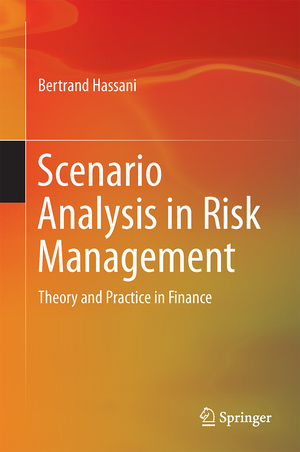Scenario Analysis in Risk Management: Theory and Practice in Finance
Autor Bertrand K. Hassanien Limba Engleză Hardback – 4 noi 2016
| Toate formatele și edițiile | Preț | Express |
|---|---|---|
| Paperback (1) | 634.68 lei 43-57 zile | |
| Springer International Publishing – 23 iun 2018 | 634.68 lei 43-57 zile | |
| Hardback (1) | 640.71 lei 43-57 zile | |
| Springer International Publishing – 4 noi 2016 | 640.71 lei 43-57 zile |
Preț: 640.71 lei
Preț vechi: 753.77 lei
-15% Nou
Puncte Express: 961
Preț estimativ în valută:
122.64€ • 133.26$ • 103.08£
122.64€ • 133.26$ • 103.08£
Carte tipărită la comandă
Livrare economică 21 aprilie-05 mai
Preluare comenzi: 021 569.72.76
Specificații
ISBN-13: 9783319250540
ISBN-10: 331925054X
Pagini: 150
Ilustrații: XIII, 162 p. 34 illus., 20 illus. in color.
Dimensiuni: 155 x 235 x 11 mm
Greutate: 0.43 kg
Ediția:1st ed. 2016
Editura: Springer International Publishing
Colecția Springer
Locul publicării:Cham, Switzerland
ISBN-10: 331925054X
Pagini: 150
Ilustrații: XIII, 162 p. 34 illus., 20 illus. in color.
Dimensiuni: 155 x 235 x 11 mm
Greutate: 0.43 kg
Ediția:1st ed. 2016
Editura: Springer International Publishing
Colecția Springer
Locul publicării:Cham, Switzerland
Public țintă
ResearchCuprins
Introduction and Environment.- Environment.- The Information set.- The Consensus Approach.- Tilting Strategy - Using Probability Distribution Properties.- Leveraging Extreme Value Theory.- Bayesian Networks.- Articial neural network to serve scenario analysis purposes.- Fault Trees and variations.- Forward looking underlying information: Working with time series.- Dependencies and relationships between variables.
Notă biografică
Dr. Bertrand Hassani is Global Head of Research and Innovation - Risk Methodology, Grupo Santander, and Associate Researcher Université Paris 1 Panthéon Sorbonne
Textul de pe ultima copertă
This book focuses on identifying and explaining the key determinants of scenario analysis in the context of operational risk, stress testing and systemic risk, as well as management and planning. Each chapter presents alternative solutions to perform reliable scenario analysis. The author also provides technical notes and describes applications and key characteristics for each of the solutions. In addition, the book includes a section to help practitioners interpret the results and adjust them to real-life management activities. Methodologies, including those derived from consensus strategies, extreme value theory, Bayesian networks, Neural networks, Fault Trees, frequentist statistics and data mining are introduced in such a way as to make them understandable to readers without a quantitative background. Particular emphasis is given to the added value of the implementation of these methodologies.
Caracteristici
Proposes different solutions to address scenario analysis issues in financial institutions Provides tutorials to help readers implement these solutions Applies the solutions to stress testing scenarios














